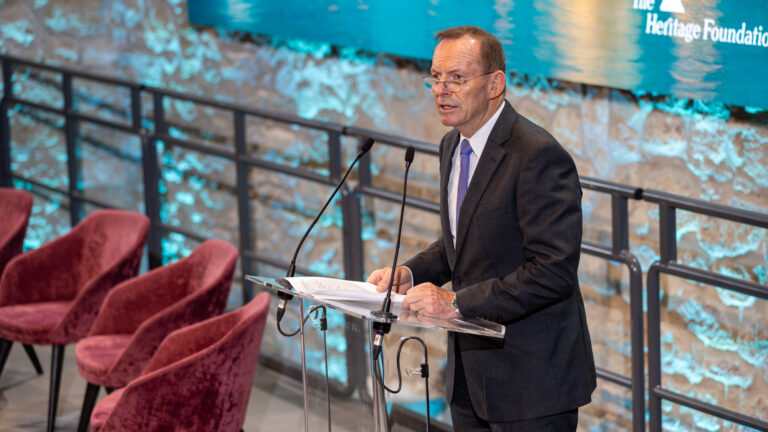When I first heard the name Men’s Club, it immediately reminded me of the 1999 movie Fight Club with Edward Norton and Brad Pitt. Most of us know the story of the film. Having lost all purpose in life, a group of men set out to reclaim their masculinity in an increasingly effeminate world. After getting to know Men’s Club better, I can say that while its basic premise seems similar, its real-life movement is overwhelmingly different at its core. While the men in the film use their newfound energy for sowing chaos and destruction as revenge for feeling abandoned by the world, Imre Bedő’s movement is all about channelling the masculine force into creation, the betterment of the world, and a life-long service to our families, communities and nations. Men’s Club has more than 160 thousand followers on Facebook, and is growing dynamically on other platforms as well, which means that there is clearly a demand for community and guidance for men who want to change their lives. At this year’s Tranzit, I asked Bedő about his movement, why it is important, and how we can all be better men.
First, could you please introduce Men’s Club and your work to the people who haven’t heard of it?
First of all, I want to address a civilisational problem and seek out a solution that everyone has to be part of. In the past, the strengthening of men in the countryside was ensured by placing terrible burdens on them. Today, these burdens are no longer there, and therefore this inner strength can only come forward artificially—and only if men choose so. Only those choosing to subject themselves to a wide variety of challenges and trials can grow strong. But because life allows us to avoid them, the vast majority will never become stronger, or be a ‘Man’ in the classical sense.
You can take the easy way out, but it leads to disease, unfulfillment and depression. We can now also see that women don’t appreciate weak, effeminate men. We could list a whole range of social problems that are rooted in this weakness. That is why I say that we need to rebuild the path to the empowerment of men—with purpose. Because the point is not that men should be kings, but that they should again be able to take their rightful place in the male–female alliance and travel the happy path of the transmission of life, because without that there will be nothing.
We see that there is a propaganda against masculinity
Things are incredibly upside-down these days. We see that there is a propaganda against masculinity, in fact, a negative international marketing campaign. Boys are deliberately blocked from wanting to become men because masculinity is, as it is said, ‘toxic’ in itself and should never be regarded as something to aspire to. They are not creating a desire in boys to become men, but rather a resistance. Be anything but a man, because masculinity is the enemy of our world.
In this sense, Men’s Club is really a place for men who are at the forefront and realise that this inner journey is an important task and it is necessary to embark on it, otherwise life will be unhappy.
Where is the crisis of masculinity the most visible today?
It seems to me that we are still adequately prepared for the job market. The purpose of the whole school system is to prepare you for the workplace. We have to start nursery school at the age of three, because it’s part of the compulsory school system, then we go to different schools, some people up to the age of thirty. Then, we are present in our workplace, but in our private life—in the scene of the creative existence of the male–female alliance—, there are a lot of problems.
On this subject, an unexpected help has just come. I’ve been talking about this for years, but the latest high-profile research by the Hungarian State Audit Office has just been published confirming it. This is, by the way, a matter of public knowledge, but, until now, not many people have looked into it apart from me. The results of the research show that the lack of male teachers is linked to boys falling behind at primary school and that far fewer boys progress to higher education relative to their birth gender ratio. Almost twice as many women graduate as men, which is a major disaster because half of the female graduates cannot find a partner with the right qualifications (with an educational level equal to theirs or above). This creates a huge social and demographic problem, because these women would gladly have children, but without a partner they are unlikely to do so.
Do you think it would be the responsibility of the government to help solve these issues?
This is a very serious phenomenon that should be addressed by at least two national programmes. First, by one that helps increase the number of male teachers. There is a lot of research on the impact of having more male teachers on boys’ progress in schools; the more the better. Even if they are not being taught directly by them, the mere presence of male teachers has a positive impact on their whole lives. Besides, for a myriad of other reasons, it would be very welcome to have more male teachers in our school system. Another programme would be to find out how to get boys into higher education at a rate at least equal to their birth gender ratio.
What we should do about men is a social and strategic question
And this does not mean that women should not go to university! I can see liberals immediately jumping on it, saying that according to Bedő, female graduates are the enemy, and that he wants to stop women enrolling in higher education. That is not the point at all. It is about the fact that in a society we need to be able to think on a society-wide scale. What we should do about men is a social and strategic question. I have written three books, and in the third one I wrote a lot about how almost every culture had and has a specific goal of what to do with men. Our culture has simply taken them into the workplace and thereby taken them out of the families.
In all your books, two central institutions are very important recurring motifs. Both are concepts against which there is now a culture war going on throughout the West. One of them, and perhaps the most important is patriarchy. In your interpretation, what does patriarchy mean, and why is it essential to understand it as the building block of civilisation?
First of all, we conservatives have to somehow achieve that young people once again understand the power of the core thesis according to which ‘conservative culture is the winning culture.’ The conservative culture is superior to the broken culture of liberalism. Or, more precisely, liberalism is not even a culture, it is the disintegration of the conservative one. We call the broken, shattered, ruined conservative a liberal. True conservatism is clearly a much higher value, the standard that can lead humanity in a good direction, and is even the secret of our personal well-being.
And that’s where the real meaning of patriarchy begins. As I wrote in my book, patriarchy is now presented as a social construct of ‘male domination’, but this was never the case. Patriarchy was a male motivational construct that forced men to make superhuman efforts for women, their families and their communities. The culture of patriarchy forced it out of men in countless ways. There was no way to escape from this compulsory responsibility because the community simply despised those who were not able to participate in it or whose efforts did not produce results.
The very same people who are now destroying this system say that patriarchy was the structure of male-domination, which is simply a lie. Our society has put the man in charge so that all the responsibility is his, and not to make him a king who does nothing. The leader has all the responsibility. He goes first, he takes on most of the tasks, he is the last to leave the sinking ship. This has its own conservative cultural image of the ‘servant leader’ who always thinks for the good of the whole of his household and his nation. A leader—with all the right archetypal characteristics—is the ultimate servant, not the liberals’ idiotised, do-nothing, half-wit emperor who makes others do what he cocks up on his throne. And if we start to build up again in our minds what being a leader truly entails, we will realise that it’s a very hard task.
Yet, not every man became a leader in the classical sense. Or did they?
What I’m talking about is that in the culture of patriarchy, every man had to have the same degree of ‘inner strength’ as a CEO today. Back then, however, each man had to be able to dominate and direct all areas of his life and undertake the highest service in them, unlike today, when there are five hundred regular employees for every CEO. The man of the past had to be able to conform to the cultural pattern according to which he could never abandon his family because he was the founder and the head of it. Whatever happened, family had to go forward. Life and values had to be passed on, and in that he took charge by leading by example.
So, the patriarchal system itself obliged men to bring the next generation up to that level. Because if the men of the next generation had failed to live up to the standards, they would have become objects of public ridicule, would have found no partners, would not have participated in the transmission of life and their bloodline would have died out. It was not as easy as it is today, when many people may simply choose not to have children. Those who were left alone could not survive either because of the harsher conditions. Parents worked with their children for thousands of years and acted in the best interest of the next generation, and this is the huge cultural pressure that always obliged men to create for the sake of others. Beside that, this also created the possibility for them to be able to become the leaders their family deserved.
And then, with that falling apart with urbanisation, the world wars and the rise of communism (so, in the last 100-150 years), this kind of inner power has ceased to be a priority. For a long time it seemed that the world was doing just fine without patriarchy. But we are the first generation to realise that we need to rebuild it, because unhappiness has reached such a high level today (families are falling apart, our personal well-being is in ruins, the loss of values leads to anxiety, depression and a myriad of illnesses), that something has to be done about it. In the comfort of urbanisation, it seemed like a good idea not to be strengthened anymore, but then women started to look down on us, we became less successful in choosing a partner, and we started to be ruled by unsuitable leaders—because the dumber we are, the dumber our leaders are. So now we’re starting to sort of rebuild our characters step by step, based on the knowledge urbanisation left behind.
The other institution I wanted to talk about is monogamy. Why is monogamous social structure so important even today?
Well, monogamy comes in as the structure through which men can be motivated. Because men are ultimately most willing to go to great lengths for the sake of the next generation, namely their children. If a man doesn’t want to invest in the future, he will just have fun and mindlessly consume. Because that’s what being a human is. But for the sake of the future generation, we will become more serious because we want to set an example for them. Many times, we become much better people for our children, and many times this happens through women. So, through starting a family, a man who is full of energy, whose life is all partying, riding a motorbike, skydiving and taking unnecessary risks, will suddenly be able to leave it all behind and start building a new life.
It is already becoming clear that our whole culture slowly becomes lost
And historically, monogamy is the system that could bring in the largest number of men for this task—for building a life. For every woman there was a man assigned by life, and he had to stick by her. Men and women are born in roughly equal numbers, so if nearly every man and woman have a partner, incredibly prosperous communities and nations can be built. The whole European culture is based on this monogamous structure, nonetheless some people work incredibly hard to dismantle it. It is already becoming clear that our whole culture slowly becomes lost. The framework that has held us together up to now can now be dismantled by simple things like putting sexuality in the centre of our lives, participating in the ridicule of monogamy and the people who stand by it, or repeatedly telling ourselves that it is a different world now and promiscuity is therefore trendy and natural.
Aren’t we living in a different world, though? A different system, if you will?
Liberalism hasn’t brought about any new system. You can only call something a new system if it works. The liberal one doesn’t, so it can’t be a system. A system is about having a set of rules and being able to describe exactly what it looks like. It is not a system if everyone does what they want, because it lacks the regulatory principle that creates the possibility of rebuilding and developing society at a higher level over a long period of time. We are at the same point again where there is the conservative system and then there is the liberal, which is in fact the conservative system in ruins.
But there is no viable alternative to conservatism and all that it encapsulates. Monogamy is what has brought our civilization here. I am not saying that no one has ever cheated on their partner, but as long as it was in spite of having rock-solid rules against it, the outcome was completely different. The education on it was different and the form of social and community control above it was different. So, as long as these rules were in place, the whole of the European culture was in fact expanding and developing, and since then it seems that the whole of the Western world has been in decline. We are declining spiritually, we are declining in numbers, and we are slowly being overtaken in everything, from production to innovation.
The second part of this interview, where we explore the purpose and the recipe for a successful life, is available here.







